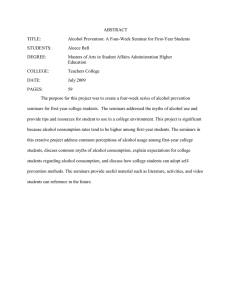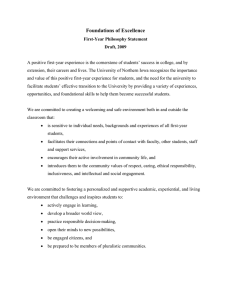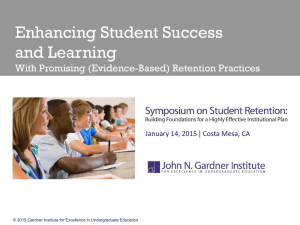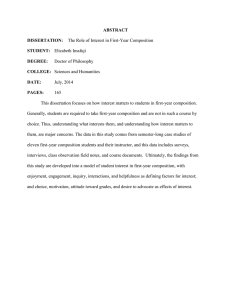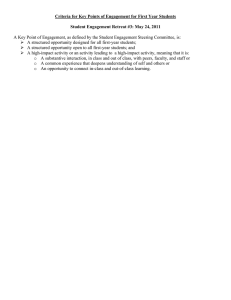“Yes, No, Maybe So”: What We Know and Don’t Know about Student Retention
advertisement
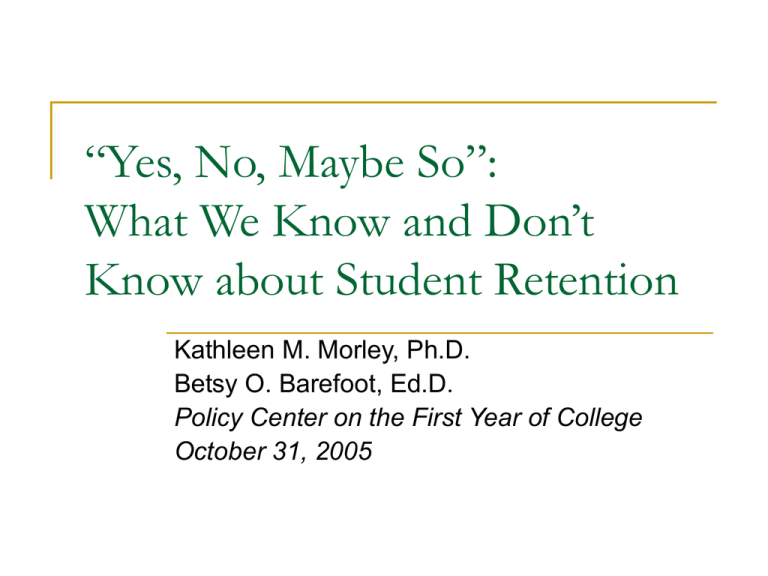
“Yes, No, Maybe So”: What We Know and Don’t Know about Student Retention Kathleen M. Morley, Ph.D. Betsy O. Barefoot, Ed.D. Policy Center on the First Year of College October 31, 2005 The College Experience Academic Integration Social Integration The College Experience Academic Performance Persistence The College Experience • Remedial programs • Supplemental instruction • First-year seminars The College Experience • Advising/counseling programs • Comprehensive at-risk programs • Undergraduate research The College Experience • Financial aid • Student-faculty interaction • Peer interaction • Residence The College Experience • Learning communities • Academic major • Engagement • Intercollegiate athletics The College Experience Summary: • Best predictor: college grades • Interventions shown to work • So, why low retention? • Assess campus needs & solutions Narrowing the Focus: Most Common (and Powerful) Retention Initiatives First-year seminars Free-standing courses Variable credit hours Variable content Graded or pass/fail Required or elective Offered at approximately 94% of American colleges and universities Can be integrated with residence life Learning communities Linking 2 or more courses Thematic connection and faculty interaction or just coenrollment Can include a first-year seminar Rarely but occasionally required Offered at approximately 62% of American colleges and universities Can be integrated with residence life Desired Outcomes – Including, but not Limited to, Retention First-year seminars Improved retention/ graduation rates Improved gpa’s More credit hours attempted/completed Student adjustment/ involvement Student satisfaction Content knowledge Learning Communities Improved retention/ graduation rates Academic gpa’s and “learning” Connections across disciplines Connections with other students Deepened diversity and leadership skills Professional development for faculty Actual Retention Outcomes First-year seminars Few random-sample or controlled studies Weight of evidence points to positive and statistically significant effects on retention Dynamics underlying effects are unclear FYS participants are 5 to 15% more likely to graduate within 4 years Learning communities Even fewer controlled studies Evidence points to positive effects on retention Dynamics underlying effects are unclear LC participants are up to 15% more likely to persist to the second year. Harnessing Potential Synergy Linking first-year seminars with learning communities Seminars can become linchpin that holds larger learning community together. Seminars can provide opportunity for academic skills practice. Seminars can address student issues without taking time away from content courses. Challenges First-year Seminar “A course about nothing” “A course about everything” Academic validity Support from faculty Student attitudes Overall quality control Learning Communities Registrar’s cooperation It’s all or nothing – no halfway participation Faculty interest and collaboration Doesn’t work for parttime students Overall quality control Either Intervention Can Be an Arrow in the Retention Quiver It’s up to you! Resources: Washington Center for Improving the Quality of Undergraduate Education, The Evergreen State College (Learning communities) National Resource Center for The First-Year Experience & Students in Transition, University of South Carolina (First-year seminars) Contact Information Kathleen M. Morley, Assistant Director morley@fyfoundations.org; 828-966-5313 Betsy O. Barefoot, Co-Director & Senior Scholar barefoot@fyfoundations.org; 828-966-5310 Policy Center on the First Year of College www.fyfoundations.org
